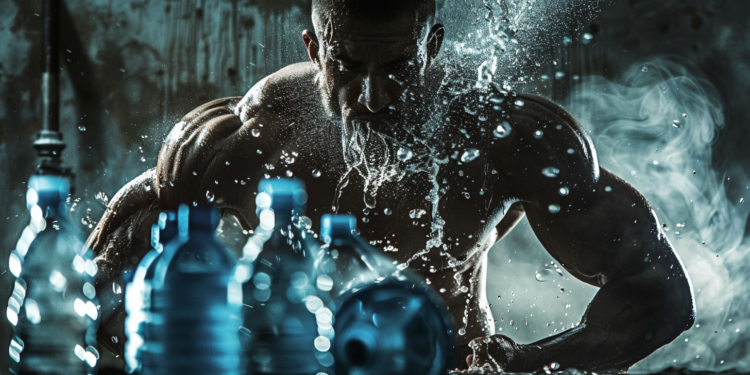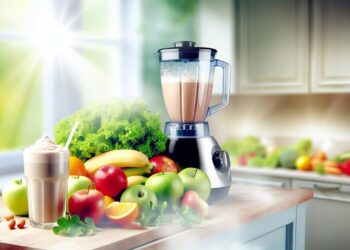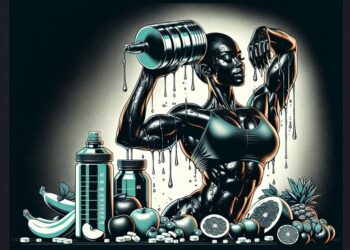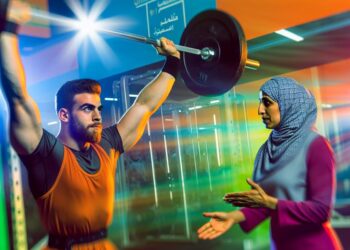Proper hydration is vital for bodybuilding success. Hydration optimizes performance and muscle growth, affecting physical prowess. Timing hydration right maximizes workout effectiveness. Dehydration lowers strength and endurance, reducing workout quality. Being hydrated enhances performance, lowers injury risks, and aids nutrient transportation. Muscles work better when hydrated, aiding growth and strength. Pre- and post-workout hydration is key for peak performance and recovery. Electrolytes restore fluid balance effectively aiding muscle function. Hydration improves muscle fullness, vascularity, and definition. Include electrolytes for enhanced balance. Drinking strategically and adapting to training demands are crucial. Proper hydration is a cornerstone for success in bodybuilding.
Key Takeaways
- Optimal hydration boosts muscle growth, strength, and performance.
- Dehydration hinders recovery, muscle function, and overall bodybuilding progress.
- Proper hydration reduces fatigue, cramps, and injury risks during workouts.
- Hydration supports nutrient transport, muscle protein synthesis, and aesthetics.
- Electrolyte balance enhances fluid regulation, energy production, and muscle contractions.
Importance of Hydration for Bodybuilders
In bodybuilding, proper hydration plays a crucial role in optimizing performance and supporting muscle growth. Hydration timing is essential for bodybuilders to ensure peak performance during workouts. Drinking water before, during, and after training sessions helps maintain hydration balance, leading to better results. Dehydration can negatively impact strength, endurance, and overall workout quality, making it vital to stay adequately hydrated throughout the day.
For bodybuilders, staying hydrated enhances physical performance by regulating body temperature and lubricating joints, reducing the risk of injuries during intense training sessions. Hydrating at the right times can prevent muscle cramps and fatigue, allowing for longer and more effective workouts. Maintaining proper hydration levels also supports nutrient transport and waste removal, crucial for muscle recovery and growth.
Hydration and Muscle Growth
Enhancing muscle growth through optimal hydration is a key factor in maximizing bodybuilding success. Hydration plays a crucial role in muscle development as it impacts performance and overall body function. Adequate water intake is essential for maintaining optimal muscle function during workouts. Dehydration can lead to decreased performance, muscle cramps, and hindered recovery processes.
When we're properly hydrated, our muscles are able to work more efficiently, allowing for better performance during training sessions. Water is necessary for nutrient transportation, waste removal, and maintaining muscle tone. Additionally, staying hydrated helps to regulate body temperature, preventing overheating during intense workouts.
To support muscle growth, bodybuilders should aim to consume water consistently throughout the day. Pre-workout hydration is vital to ensure optimal performance, and post-workout hydration aids in the recovery process. Monitoring urine color can be a helpful indicator of hydration status; a pale yellow color is typically a good sign of adequate hydration.
Hydrations Impact on Strength
Optimal hydration not only supports muscle growth but also significantly impacts strength levels in bodybuilding performance. Staying adequately hydrated is crucial for enhancing performance, endurance, and overall strength gains. Here are three key ways hydration influences strength in bodybuilding:
- Performance Enhancement: Proper hydration levels help maintain optimal blood volume, which is essential for delivering oxygen and nutrients to working muscles. This leads to improved performance during workouts and allows for greater strength output.
- Endurance: Adequate hydration supports muscle function by preventing cramping and fatigue, enabling bodybuilders to sustain higher intensity levels for longer durations. This increased endurance translates to improved strength over time.
- Muscle Recovery: Hydration plays a vital role in the recovery process by aiding in the removal of waste products from muscle cells and reducing inflammation. This accelerates muscle repair and growth, ultimately contributing to enhanced strength development in bodybuilders.
Ensuring proper hydration levels isn't only essential for muscle growth but also critical for maximizing strength gains and overall performance in bodybuilding.
Hydration During Workouts
Maintaining proper hydration levels during workouts is crucial for optimizing performance and supporting muscle function in bodybuilding. Pre-workout hydration is essential to ensure that your body starts the exercise session adequately hydrated. Drinking water before a workout helps maintain electrolyte balance and prevents dehydration, which can negatively impact strength, endurance, and cognitive function. Aim to consume around 17-20 ounces of water 2-3 hours before exercising and an additional 7-10 ounces 10-20 minutes prior to starting your workout.
Post-workout rehydration is equally important to replenish fluids lost through sweat and support muscle recovery. After intense exercise, it's recommended to drink 16-24 ounces of water for every pound lost during the workout. Including electrolytes in your post-workout hydration can aid in restoring the body's fluid balance more effectively. Rehydrating properly after a workout helps reduce the risk of muscle cramps, fatigue, and accelerates the recovery process, allowing you to perform better in subsequent training sessions. Remember, staying hydrated during workouts is a key component of bodybuilding success.
Hydration for Recovery
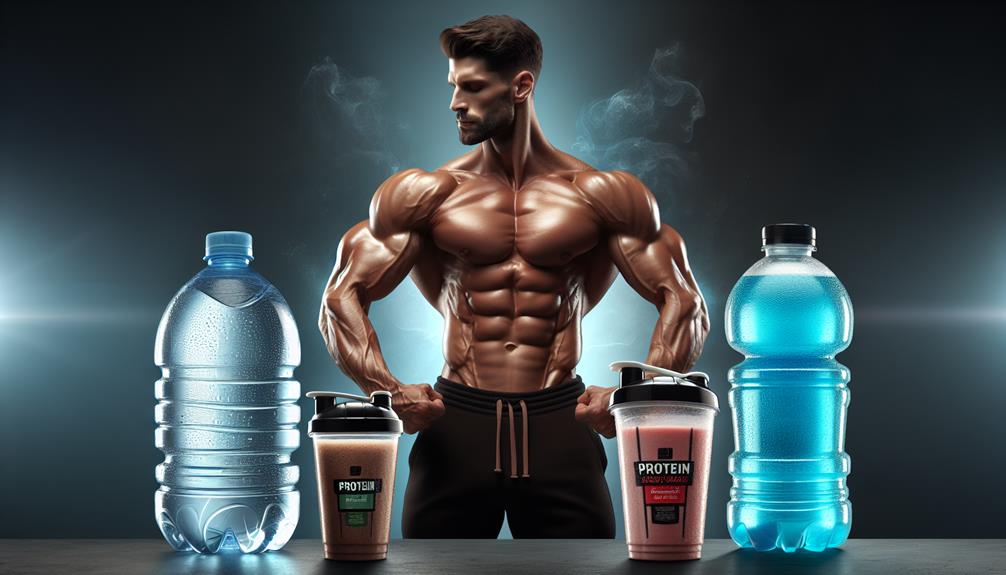
For effective muscle recovery after intense workouts, proper hydration plays a crucial role in replenishing lost fluids and supporting the body's repair processes. Ensuring adequate post-workout hydration offers numerous recovery benefits that are essential for bodybuilders striving for optimal performance and muscle growth.
- Enhanced Nutrient Delivery: Proper hydration post-exercise helps transport essential nutrients to muscles, aiding in their repair and growth.
- Muscle Repair and Growth: Adequate hydration supports the body's ability to repair damaged muscle tissues and promote muscle hypertrophy.
- Reduction of Muscle Soreness: Staying well-hydrated post-workout can help alleviate muscle soreness and stiffness, allowing for quicker recovery and readiness for the next training session.
Maintaining optimal hydration levels after workouts is key to maximizing the benefits of your training regimen. By prioritizing post-workout hydration, you can accelerate recovery, reduce muscle fatigue, and support overall muscle health and growth.
Optimal Hydration Levels
Hydration levels play a critical role in supporting muscle recovery and performance in bodybuilding. Adequate fluid intake is essential for bodybuilders to maintain optimal hydration levels. Dehydration can negatively impact performance by reducing strength, endurance, and overall workout efficiency. To optimize performance, bodybuilders should aim to consume enough fluids before, during, and after training sessions.
Fluid intake requirements vary depending on individual factors such as body weight, workout intensity, and environmental conditions. A general guideline is to drink at least 8-10 cups of water per day, but this may need to be adjusted based on personal needs. Monitoring urine color can be a helpful indicator of hydration status; pale yellow urine usually indicates adequate hydration levels.
Dehydration Risks in Bodybuilding
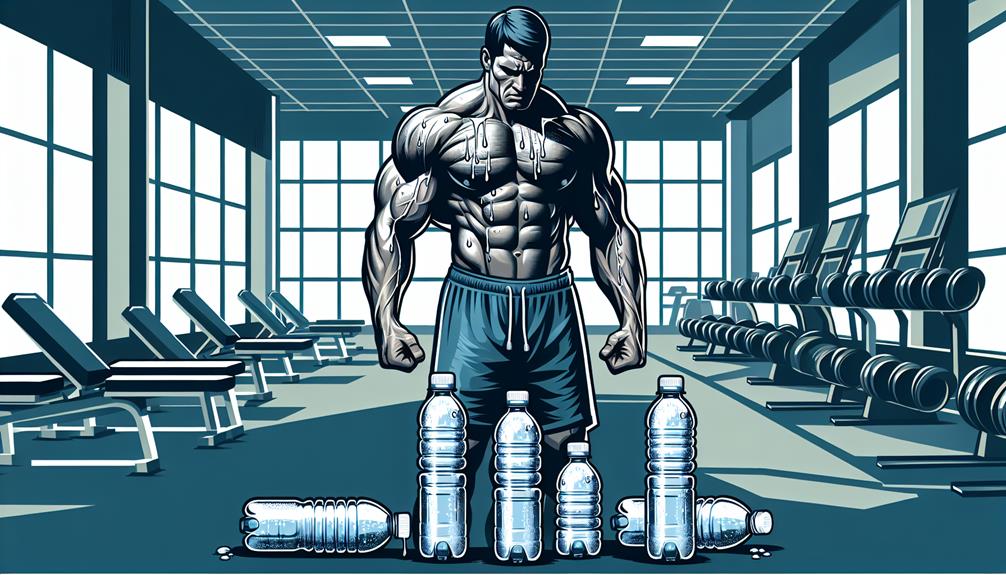
Dehydration poses significant risks to bodybuilders' performance and overall health, impacting muscle function and recovery. Proper hydration is crucial for bodybuilders to optimize their training and achieve their goals. Here are some dehydration dangers to be aware of:
- Decreased Performance: Even mild dehydration can lead to decreased strength, endurance, and focus during workouts.
- Impaired Recovery: Insufficient fluid intake hinders the body's ability to repair and build muscle after intense training sessions.
- Increased Risk of Injury: Dehydration can cause muscle cramps, dizziness, and fatigue, increasing the likelihood of injuries during workouts.
To mitigate these risks, bodybuilders should prioritize adequate fluid intake throughout the day, especially before, during, and after training sessions. Monitoring urine color, body weight fluctuations, and thirst cues can help individuals stay on top of their hydration status.
Hydration and Body Composition
Maintaining optimal fluid balance is pivotal for sculpting lean muscle mass and achieving an athletic physique in bodybuilding. Hydration balance plays a key role in body composition by affecting muscle function, metabolism, and overall performance. Dehydration can lead to a decrease in muscle protein synthesis, impair nutrient delivery to muscles, and hinder muscle recovery post-workout. Adequate hydration is essential for maximizing bodybuilding performance, as even slight dehydration can negatively impact strength, endurance, and muscle contractions during training sessions.
In bodybuilding, water isn't only essential for basic physiological functions but also for promoting an anabolic environment that supports muscle growth. Proper hydration helps to maintain muscle fullness, vascularity, and overall muscle definition, which are crucial aspects of achieving an aesthetically pleasing physique. Additionally, staying well-hydrated can aid in reducing water retention, bloating, and the appearance of subcutaneous water under the skin, all of which can influence body composition and the visual impact of muscle definition. Therefore, prioritizing hydration balance is fundamental for optimizing bodybuilding performance and enhancing body composition.
Electrolytes and Hydration
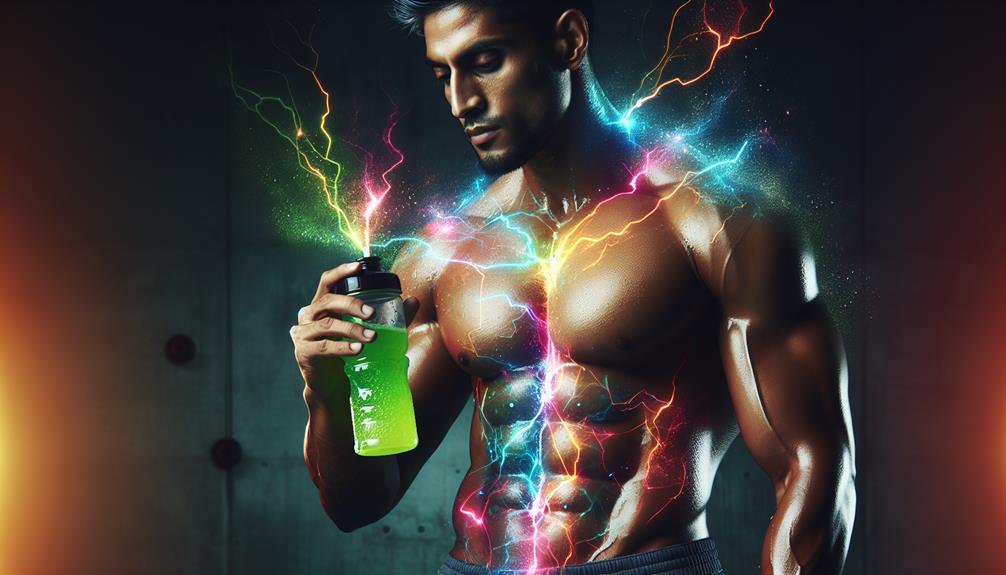
Ensuring adequate electrolyte intake is crucial for optimizing hydration levels and supporting peak performance in bodybuilding. Electrolyte balance plays a vital role in maintaining proper fluid levels within the body, which is essential for muscle function and overall performance.
Here are three key points to consider regarding electrolytes and hydration performance:
- Sodium and Potassium: These electrolytes are particularly important for regulating fluid balance and muscle contractions during intense workouts.
- Magnesium: Magnesium is involved in over 300 enzymatic reactions in the body, including those that support muscle function and energy production.
- Calcium: Calcium isn't only crucial for bone health but also plays a role in muscle contractions, making it essential for strength and performance in bodybuilding.
Maintaining the right balance of these electrolytes through proper hydration practices can help prevent cramping, optimize muscle function, and enhance overall bodybuilding performance.
Hydration Strategies for Success
Staying properly hydrated is essential for maximizing bodybuilding performance and achieving optimal results. Hydration timing plays a crucial role in ensuring that your body has the necessary fluids to support muscle function and recovery. It's important to hydrate before, during, and after workouts to maintain peak performance levels.
Before hitting the gym, aim to drink around 16-20 ounces of water a few hours before exercising. During your workout, sip on water regularly to replace fluids lost through sweat. Post-workout, replenish your body by drinking another 8-16 ounces within 30 minutes of finishing your session.
In addition to timing, hydration supplements can be beneficial for bodybuilders, especially those engaging in intense training sessions. Electrolyte-enhanced drinks or powders can help replace lost minerals and improve hydration levels. Consider incorporating these supplements into your routine, particularly if you're sweating excessively during workouts or training in hot environments.
Frequently Asked Questions
Can Overhydration Be Harmful for Bodybuilders?
Yes, overhydration can disrupt hydration balance and electrolyte levels in bodybuilders. It may lead to hyponatremia, causing symptoms like headaches and confusion. Monitoring fluid intake is crucial to avoid this risk and maintain optimal performance.
How Does Hydration Affect Bodybuilders' Metabolism?
Staying hydrated optimizes our body's metabolic efficiency, acting like fuel for a well-oiled machine. Balancing electrolytes is crucial for peak performance, helping bodybuilders maintain energy levels and support muscle function during intense workouts.
Are There Specific Hydration Strategies for Different Bodybuilding Competition Phases (Bulking, Cutting, Maintenance)?
During different bodybuilding phases, like bulking, cutting, or maintenance, specific hydration strategies optimize our performance and enhance muscle recovery. Tailoring fluid intake to match training intensity and goals is key for success.
Can Hydration Impact Bodybuilders' Mental Focus and Concentration During Training Sessions?
Staying hydrated directly impacts cognitive performance. Dehydration can hinder mental focus and concentration during intense training sessions. It's crucial to maintain proper hydration levels to optimize training intensity and achieve peak performance in bodybuilding.
What Are the Potential Long-Term Effects of Chronic Dehydration on Bodybuilders' Health?
Long term consequences of chronic dehydration can severely impact bodybuilders' health. Maintaining proper hydration balance is crucial for muscle function, recovery, and overall well-being. Neglecting hydration can lead to decreased performance, muscle cramps, and even organ damage.
Conclusion
In conclusion, staying properly hydrated is essential for bodybuilding success. It plays a crucial role in muscle growth, strength, workout performance, and recovery. Dehydration can hinder progress and increase the risk of injury.
By implementing effective hydration strategies, such as consuming enough water and electrolytes, bodybuilders can optimize their performance and achieve their goals. Remember, 'hydrate or die-drate' – don't overlook the importance of staying hydrated in your fitness journey.



